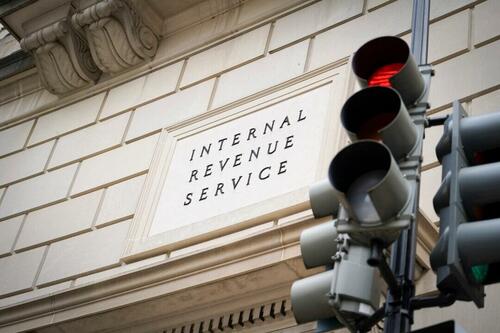IRS Vows Tax-Enforcement Crackdown After Audit Reveals $1.4 Billion In Unpaid Taxes From Gambling Winnings
Authored by Tom Ozimek via The Epoch Times (emphasis ours),
The IRS said it is preparing a tax-enforcement crackdown after a Treasury Inspector General for Tax Administration (TIGTA) audit revealed that more than $1.4 billion in taxes may have gone uncollected from individuals who won large sums in gambling.

The report from TIGTA’s audit, released on Sept. 30, found that nearly 150,000 Americans with gambling winnings exceeding $15,000 between 2018 and 2020 failed to file tax returns, leaving potentially significant amounts of unpaid taxes.
The watchdog’s report identified more than $13.2 billion in gambling winnings during the period in question, while estimating that the IRS “could potentially increase tax revenue by approximately $1.4 billion through addressing the 139,045 individual nonfilers with gambling winnings.”
The audit revealed that tax enforcement on nonfilers with gambling winnings has been limited, with the TIGTA noting that 103,000 individuals from this population have not been issued notices or faced other enforcement actions to bring them into compliance. The watchdog recommended that the agency “begin appropriate enforcement actions” to collect the unpaid taxes.
In a written response to the report, the IRS agreed with the recommendation, vowing to begin enforcement actions.
“We agree. For tax years (TY) 2018 through 2020, the IRS will identify high-income non-filers with gambling winnings where no enforcement actions have been taken, including the top 100 non-filer cases identified by TIGTA,” wrote Lia Colbert, commissioner of the IRS’s Small Business Self-Employed Division, which oversees the agency’s collection activities and the examinations of most U.S. businesses.
“We are committed to improving tax compliance.”
Colbert said the IRS would begin enforcement by issuing the first return delinquency notices to select nonfilers with gambling winnings.
However, the audit raised further concerns beyond income-tax compliance. Hundreds of W-2G forms, which are used to report gambling winnings, were filed without the required taxpayer identification numbers (TINs), making it difficult for the IRS to track the winnings and enforce tax compliance, the TIGTA found. The watchdog also pointed out that the IRS has few processes in place to identify noncompliance with excise taxes by gambling operators, particularly in the rapidly growing online sports-betting market.
While the IRS agreed with most of the watchdog’s recommendations, it disputed the significance of the W-2G forms missing TINs, arguing that they represent a small fraction of overall reporting. In response, the TIGTA wrote that “while this population may not be large in absolute terms, we believe that the amount of backup withholding that should have been withheld is significant” and that the IRS should investigate payers who filed W-2G forms with missing TINs.
In a separate report, also released on Sept. 30, the TIGTA found potential unpaid taxes and penalties stemming from early retirement withdrawals. The watchdog estimated that around 2.8 million taxpayers who took early retirement distributions between 2018 and 2022 might owe some $1.6 billion in additional taxes and failure-to-pay penalties.
However, the IRS disputed these findings, stating in a written response that a “very high” percentage of these taxpayers qualify for exemptions and that the actual amount of unpaid taxes would likely be much less. The IRS also took issue with an additional $788 million in estimated unpaid taxes related to retirement withdrawals, arguing that the TIGTA’s analysis did not account for income reported on other tax forms or exemptions that applied to many of the early distributions. Still, the IRS partially agreed with the watchdog’s recommendations, including vowing to look into 54 taxpayers who did not report early retirement distributions as income on their tax returns.
The TIGTA’s audits, which highlight gaps in compliance and enforcement, signal that more aggressive tax-collection efforts may be on the horizon, as the IRS faces pressure to reduce the “tax gap,” which is the difference between taxes owed and taxes paid.
Tyler Durden
Sat, 10/05/2024 – 10:30
via ZeroHedge News https://ift.tt/k5AYsIj Tyler Durden